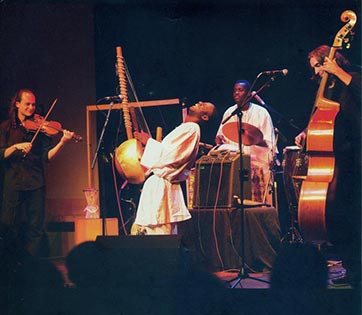Results: 150 to 150 of 190
Seckou Keita Quartet +
Country Senegal UK Genres acoustic band dance fusion pop roots Website www.seckoukeita.com Festival Sauti za Busara 2008 Recordings 📼 Mali (2003), Afro Mandinka Soul: Tama-Silo(2006)
It was under the guidance of his uncle Solo Cissokho (see Ellika & Solo; Sauti za Busara Festival 2007) that Seckou Keita launched his international career in 1996, with appearances at Norway's Forde Festival, in a collaboration with Cuban, Indian and Scandinavian musicians.
In following years, Keita relocated to UK, while touring regularly in Spain, France, Portugal, Greece and Czech Republic as well as playing at WOMAD and Glastonbury festivals, Montreal and London Jazz festivals both as solo musician, and in collaboration with others.
In 2000 Keita recorded his own solo debut Baiyo, which encompassed his musical journey, from Africa to Europe, via India. He went on to play support slots to luminaries like Salif Keita and Youssou N'Dour, and solo slots at London's Jazz Café. In 2001 he was nominated for a BBC World Music Award, It's clear that Keita's many collaborations have fed and extended rather than diluted the African mainspring of his music.
"Everything in music has to be honest, and the deeper meanings of the songs and melodies must be preserved", he explains. "This is why it's important that collaborations should be right for the music, and there are connections between, say, Cuban and Indian sounds and the repertoire of the kora that can be explored without losing the distinct flavours of the different traditions and styles."
Keita's current project, the Seckou Keita Quartet +, is exciting, drawing together a group of musicians from disparate origins who nonetheless superbly complement one another. The richly layered songs on the Quartet's Afro Mandinka Soul album range from the haunting African soul of Tounga to upbeat floor-fillers like Sina Mory and N'fa Quartet.
"There is only one traditional tune, Djula Djekere", Keita points out, "but even though the songs on the CD are mainly original, they are rooted in the tradition."
"The upright bass may be from Italy, the violin from Egypt, and the percussion from Gambia, but these instruments all speak the same language". This is also why they also decided to integrate another voice from The Gambia. Featuring Keita's voice and kora alongside bass, violin, congas and calabash percussion, together with Binta Susso's soulful voice; it's another step on a long but unforced journey, which began to coalesce with a 2004 UK tour under the title Acoustic Vibes.
"Our album is called Tama-Silo, The Journey", says Keita. "There's barely a place we've played that people haven't asked how we thought to put these things together, but it was never an idea, simply something that feels very natural, especially when things begin to happen onstage".
"There's a real joy created when we perform live", he continues, "which translates itself directly to audiences. Whether we play an upbeat dance tune, or a sad, soulful tune, people respond to the energy that flows between us. We challenge each other all the time, so that Davide's bass will bring in textures I must respond to, or Samy's violin will introduce tones that complement and add to the range of the kora." Far from marking the end of the journey, the new album Afro Mandinka Soul is a kind of beginning, I hope", he says. "To put it very simply, the more I play with these musicians, the more I feel we can accomplish together."
 With thanks to British Council TZ
With thanks to British Council TZ

